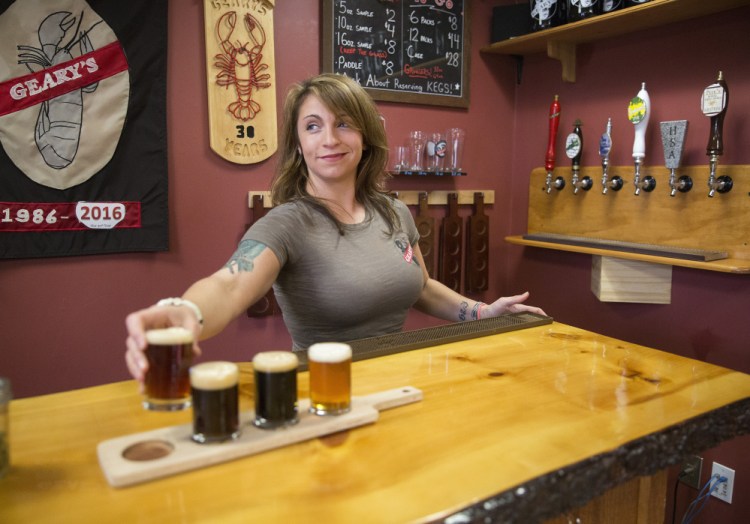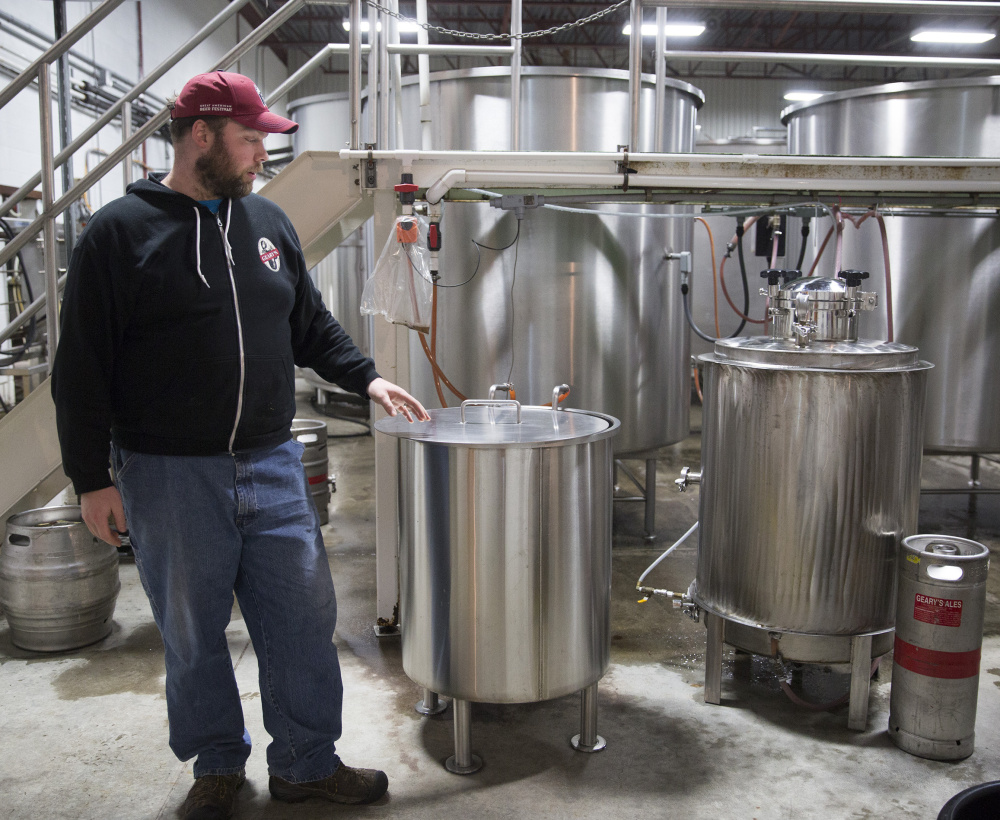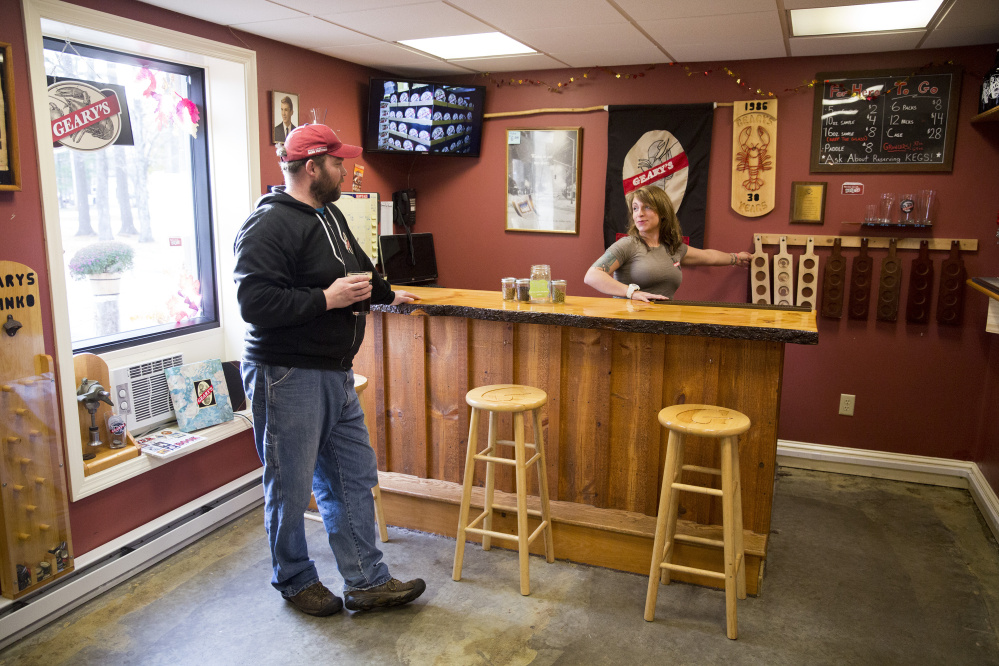Becky’s Diner on Portland’s waterfront made a little change to its modest beer lineup this summer. It stopped carrying Brooklyn Lager and started carrying Bissell Brothers’ brash, super-hoppy ale, The Substance.
A few blocks away, Portland Pie Co. shook up its offerings by adding more tap handles for tiny Portland brewers Bunker and Austin Street.
Up the block, Brian Boru took a couple of national breweries off tap and added Substance and Austin Street’s Patina Pale Ale.
While restaurants and bars across the region dump national brands in favor of Maine-made craft beers, the trend has skipped over one local brewer – Geary’s, the brewer that started it all.
D.L. Geary Brewing Co., founded in 1983, was Portland’s first craft brewer. But as younger, hipper beer makers pop up all around it, Geary’s production has dropped significantly. Numbers provided by the state’s Bureau of Alcoholic Beverages and Lottery Operations show Geary’s made 34.5 percent less beer in 2015 than in 2011. Conversely, craft breweries produced 113.8 percent more beer in 2015 than in 2011, according to the Brewers Association, a national craft beer organization.
“It’s changed dramatically,” D.L. Geary said of the craft brew landscape. “It’s certainly a lot more crowded than it used to be. We’re up to 75 breweries in the state. The number of out-of-state brands in the state has more than doubled in the last few years. And it’s a zero-sum game. … There aren’t more beer drinkers now.”
EARLY ADAPTERS
With little local competition, D.L. Geary watched his brewery grow dramatically for decades before its recent production downturn.
Now the brewery is seeing its beers disappear from the taps at local bars and restaurants. And stalwarts like Geary’s Pale Ale, Special Hampshire Ale and London Porter don’t sell as much as they used to at liquor stores and supermarkets.
Geary’s problem is far from unique in the old-school craft beer world.
Sam Adams, founded in 1984, launched brands that introduced hard-alcohol sodas and its Twisted Tea to grow sales. Sierra Nevada, founded in 1980, has introduced new beer to chase seasonal tastes.
At Maine’s largest brewery, Shipyard Brewing Co.’s public water usage data show that its production has been roughly steady from 2011 to 2015. The state bureau of alcoholic beverages did not provide beer production data for Shipyard from 2011 to 2015. Shipyard makes its own beers and sodas, and contracts with other breweries to make beer at its Portland facility.
Shipyard co-founder Fred Forsley said he and partner Alan Pugsley have followed public taste to grow and maintain their size. The company’s success was built on Export, an English-style ale that’s maltier than most ales now in favor with drinkers. Then Shipyard added Pumpkinhead Ale, a seasonal beer that accounts for about 40 percent of all its annual sales, Forsley said. And now the brewery makes Monkey Fist and Island Time IPAs, which have surpassed Export’s production numbers.
The upshot? The brewery ran at capacity all summer, Forsley said. If it sells more IPA than English ale, so be it.
“I’ve kind of embraced it, to be honest with you. I think that at the end of the day you’ve gotta embrace some of this,” Forsley said of the shift in tastes. “I recognize Monkey Fist and Island Time are going to take over some of the heavy lifting that Export has done.”
The heavy lifting at Geary’s has been done by its Pale Ale and HSA. They won’t be getting rid of any of their mainstays, Geary said, but he is willing to try some new things.
The brewery installed a new pilot system so it can brew small batches of beer to see what consumers like in its tasting room. The plan is to find new brews that appeal to younger customers.
“We’re having some fun. We’re doing some unusual things,” Geary said. “We’re experimenting with different grains, different strains of yeast and the results have been very well received. We can’t just say, ‘OK, we’ll make this beer,’ and sell it because our small system is 24 barrels, and that’s an awful lot of kegs.
“So what we’re able to do (on the pilot system) is innovate on a small scale, invite our customers and friends into the tasting room to try them, and that way, if we get enough interest, we will be able to do the larger system and have the beer be pre-sold, which our distributors love.”
IN NEED OF A MAKEOVER?
Some analysts say the Geary’s brand is due for a makeover. Dick Cantwell, a renowned beer entrepreneur and brewer, used to vacation in Maine. He said he fondly remembers drinking Geary’s Pale Ale in South Harpswell, and that little has changed with the brand since the 1980s.
“Like many established older brands, Geary’s has allowed their branding to stale, and hasn’t done much to come up with new beers to excite the imagination of craft beer drinkers,” Cantwell said.
Jason Notte, who writes about the beer industry for MarketWatch, said the brewery needs an infusion of creativity similar to what some small Belgian breweries have done to revive themselves.
“First of all, I would not discount the value of intellectual property. You have an established brand in Geary’s,” Notte said. “Geary’s needs somebody that can push it ahead. I don’t blame D.L. This brewery is something that has worked for him for a long time. But I think he needs somebody fresh in there. This is Portland’s original brand; they need to update styles and bring in some new styles. You can’t get rid of the lobster from the tap handles, that’s something classic. But you make it a relevant brewery again.”
Geary’s response to this advice? He’s working on it. In addition to the pilot system, the brewery rolled out small batches this summer. It barrel-aged some beers for special releases and has had special beer dinners at restaurants.
The brewery isn’t in danger of going out of business, Geary said. It grew consistently over 30 years and Geary isn’t going to walk away. Instead, he’s starting a new chapter.
“The vision is to keep this ancient and honorable art and profession going,” Geary said. “The way we do it is to adapt to a changing marketplace.”
Send questions/comments to the editors.




